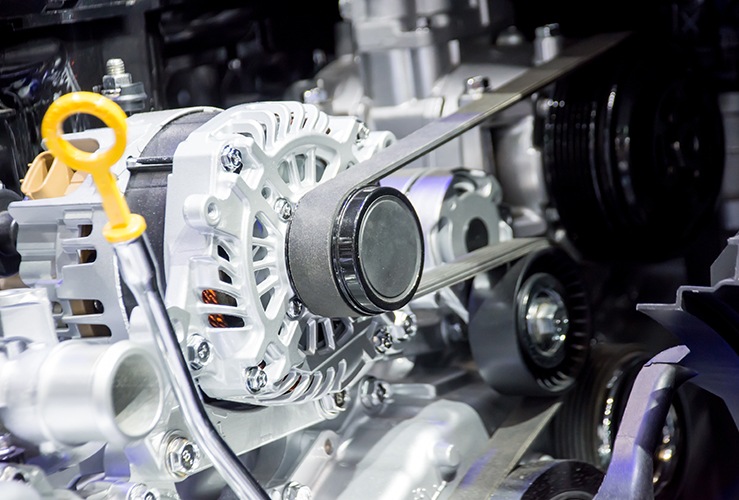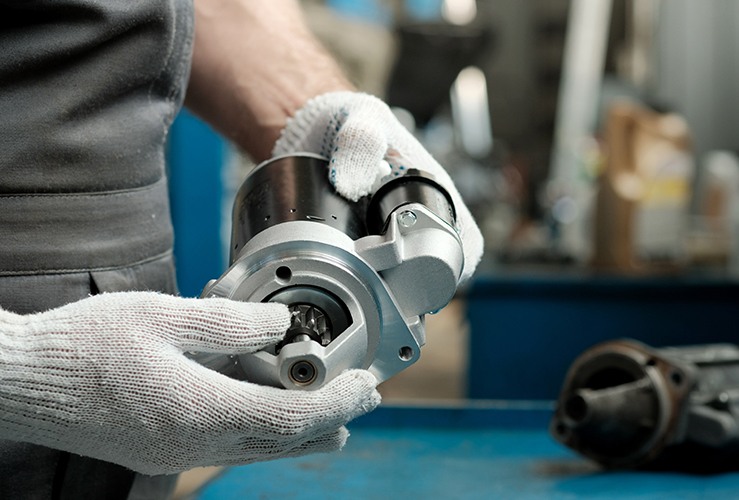Learn to spot the symptoms of a faulty starter motor, and about repairing or replacing this critical component.
Your vehicle's ‘starter’ is an electric motor responsible for generating sufficient torque to get your main engine started.
The starter motor connects to the engine flywheel, delivering a brief but significant amount of torque which gets the engine up and running. In the early days of motoring, drivers had to crank their engines manually by turning a handle inserted into the front of the car; this took some effort and could be dangerous. Today, this task is accomplished by the starter.
If your starter motor has developed a fault, your engine either wont start or will have difficulty starting.
When should I replace my starter motor?
Your starter should last for the lifespan of your vehicle - typically 100,000 to 150,000 miles. However, it could develop a fault or sustain damage, in which case it would need to be repaired or replaced.
How much is a starter motor?
The cost of replacing your starter motor will depend on the make and model of your vehicle. Costs range from £160 to £325, inclusive of labour. Starter motors are difficult to access in some vehicles, which can increase the time required to carry out a replacement - bumping up labour costs. Costs also vary across the UK, so where you live can impact how much you pay.
Starter motor repair
If you have the necessary experience, you may attempt to repair the starter motor yourself. However, for most car owners, it's quicker and easier to enlist a trained mechanic to effect a repair, or more likely, replace the component altogether. In some cases, a starter motor repair job may be just as costly as a replacement.
6 faulty starter motor symptoms
Diagnosing a fault can be tricky because some starter motor symptoms are similar to signs of an alternator or battery problem. That said, here are the most common symptoms of a faulty starter motor.
1. No crank, no start, or weak crank
In most cases where there's a complete starter motor failure, your vehicle will fail to crank and start.
However, in other cases, the starter may not have completely failed, and may still be able to generate enough torque to start the engine - but perhaps more slowly and laboriously than usual.
2. Clicking noises or other unusual sounds
A type of electromagnet called a solenoid is connected to your starter motor. After turning the ignition, if you hear a clicking sound this usually means that the starter motor solenoid is working as it should, but the starter is failing to crank.
But if the starter motor’s solenoid has developed a fault, you won’t hear a clicking sound when you turn the ignition.
Less commonly, there may be whirring or grinding sounds. However, these are normally associated with an alternator problem.
3. An absence of electrical issues
If your car's other electrical components (headlights, radio, dashboard lights etc.) work as usual, this suggests the battery is working as it should, and is therefore a sign there could be a starter motor issue.
However, you could face a situation where the battery has just enough power to run the car's electrical components, but not enough to fire up the starter motor. In such a scenario, your starter will usually attempt to crank the engine. The effort to do so may result in your car’s other electrical components failing due to the surge in power being delivered to the starter (i.e. the effort drains the battery).
Ultimately, if your vehicles' electrical components work but the starter fails to crank, it does suggest there is a starter motor problem (rather than an alternator or battery fault).
4. Smoke/burning electrical smells
If you have a starter motor problem and keep on attempting to start the vehicle, you may inadvertently overheat the electrical system. If this occurs, you may notice an electrical burning smell, or smoke issuing from the engine bay. In this situation, do not try to start the engine again, or you may cause costly-to-repair damage to the electrical system.
Note that smoke/burning smells are uncommon symptoms of a starter motor fault; it’s more likely to be one of the other issues listed.
5. Visual clues
If you inspect the starter motor and notice it's covered in fluid, this suggests that oil or coolant may have leaked onto it, potentially causing it to fail.
Unfortunately, in many vehicles the starter motor is positioned where it could be impacted by oil or coolant leaks. Such a leak might damage either the starter or the solenoid, or both.
6. Engine fails to start after using jump leads
If you try to start the engine using jumper cables and the starter still doesn't turn over, it's likely it has developed a fault.
However, if the engine fires up then stalls soon after, this suggests you have an alternator problem.
This jumper cable test may get your vehicle up and running fine. But if it fails to start the next time round, you probably have a bad battery.

Taking your vehicle to a professional
If you have the required knowledge and experience, you may try to diagnose the problem yourself, then repair or replace the component as necessary. This could save you money. However, a trained mechanic should be able to swiftly diagnose and repair/replace a faulty starter motor - or deal with any other problem your vehicle may have. This option could save you time and effort.





